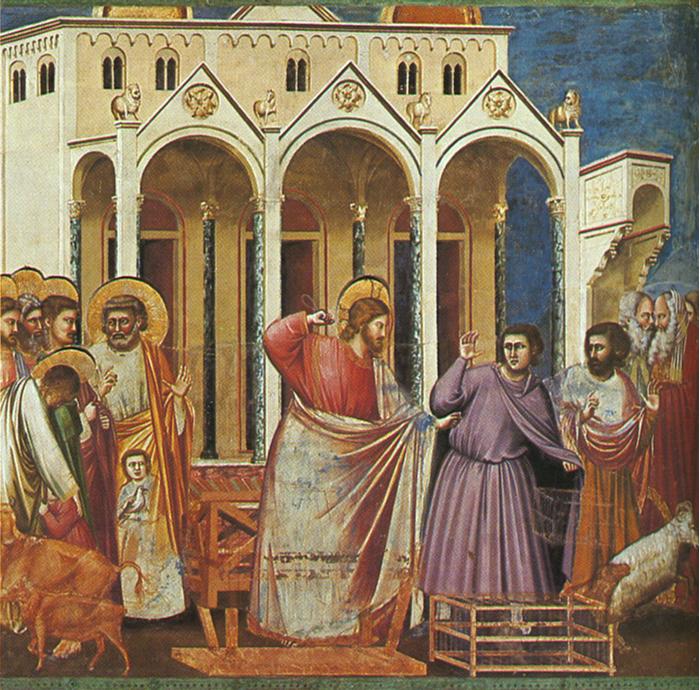Readings: Exodus 20: 1-17; Psalm 19; I Corinthians 1: 22-25; John 2: 13-25
 Today’s gospel narrates a decisive event in the life of Jesus: by entering into the temple, and challenging the status quo, Jesus becomes a problem that the temple authorities can no long afford to ignore. By driving out the moneychangers and the traders, Jesus isn’t just challenging the authority of the temple leaders, he’s hitting them where it hurts – in the pocketbook – and during the potentially lucrative season of the Passover pilgrimage. So it seems that it is this incident - more than any other – which provokes the leaders of the Jewish people to conspire against Jesus, and it is the words which Christ speaks in today’s gospel which they place in evidence against him before the Sanhedrin (Mt 26:61).
Today’s gospel narrates a decisive event in the life of Jesus: by entering into the temple, and challenging the status quo, Jesus becomes a problem that the temple authorities can no long afford to ignore. By driving out the moneychangers and the traders, Jesus isn’t just challenging the authority of the temple leaders, he’s hitting them where it hurts – in the pocketbook – and during the potentially lucrative season of the Passover pilgrimage. So it seems that it is this incident - more than any other – which provokes the leaders of the Jewish people to conspire against Jesus, and it is the words which Christ speaks in today’s gospel which they place in evidence against him before the Sanhedrin (Mt 26:61).For us, this account from the life of Jesus can be deeply challenging: the Jesus we see in today’s gospel doesn’t easily fit the image we often have of a man of peace, a man of prayer, and a man of wisdom. Anger is so often for us an occasion of sin, and yet here we see Christ – whom we acknowledge to be sinless – apparently flying into a rage. And what’s more there’s nothing inherently wrong about the work of a money-changer or of a trader: they exist for the benefit of the pious Jewish pilgrims, that they might make their temple offerings as required by Jewish law, without using Roman money which bore the idolatrous image of the Emperor. So what is it that provokes Jesus, and what justifies his anger?
 In the Synoptic Gospels’ account of the temple incident, Jesus accuses the traders of turning His father’s house into a “den of robbers” (Mt 12:13). It seems that when money became involved, there quickly followed dishonesty, and the worship of God was corrupted by those seeking to make a quick buck. What’s worse is that this was taking place right next to the temple enclosure, in the Court of the Gentiles: not the holiest place in the temple, but nonetheless a place consecrated to the worship of the true God, to spiritual affairs, not to the affairs of the marketplace.
In the Synoptic Gospels’ account of the temple incident, Jesus accuses the traders of turning His father’s house into a “den of robbers” (Mt 12:13). It seems that when money became involved, there quickly followed dishonesty, and the worship of God was corrupted by those seeking to make a quick buck. What’s worse is that this was taking place right next to the temple enclosure, in the Court of the Gentiles: not the holiest place in the temple, but nonetheless a place consecrated to the worship of the true God, to spiritual affairs, not to the affairs of the marketplace.For St Thomas Aquinas, today’s gospel is evidence that it isn’t always a sin to be angry. Certainly, we often sin through anger, but it can also be a sin not to be angry (ST II-II, q158, a8). The anger of Jesus today is not the anger of a hurt pride that we might feel when we don’t get our own way, but anger at injustices being perpetrated against others. Anger can be the emotion that drives us to change the world for the better: as St Augustine says, “hope has two beautiful daughters: their names are courage and anger. Anger at the way things are, and courage to see that they do not remain the way they are”.
In their exchange with Jesus the temple leaders mistake the bricks and mortar of the temple building (hieron) with the interior temple of Christ’s body (naos). In this Lenten season we open ourselves to Christ’s purifying action within our bodies, which through Baptism have become temples of the Holy Spirit. Through prayer and penance we ask Christ to restore the fullness of our human dignity, to drive out the ways in which we so often corrupt it through sin, and to help us to recognise the true dignity of those around us, especially the poor, the sick and the suffering. We ask God to open our eyes, that we may see the truth about humanity created by God that we might delight in God and that He might delight in us, no matter how glorious and beautiful that truth may be.
No comments:
Post a Comment